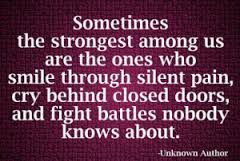All your life you’ve been viewed as an ‘able-bodied’ person. You don’t worry about navigating the world in terms of accessible spaces, ramps leading to public buildings, or being aware of laws like the Disability Discrimination Act (DDA). So far you’ve been fortunate right? This may not be entirely accurate. Disability isn’t always visible; in fact, it can be so complex and elusive that even the affected person may not realize they are facing unequal challenges every day.
Pain is pain, and disabilities can be visible or invisible
Maybe you have thought sitting in front of your computer… “I’m lazy and need to work harder, just focus.” Meanwhile, you’re unaware that you’ve developed a physical ailment such as chronic fatigue syndrome. This is not uncommon, as many people rise each day with a subtle sickness or vague pain that not even the doctor can diagnose. Silent suffering constantly surrounds us; it could be that wincing woman walking to work with a migraine, or the man who is breathing through a panic attack on the bus. Chronic pain, undiagnosed conditions, and mental illnesses are some of the most common invisible disabilities that are not discussed, and thus stay hidden in the workplace. Often the fear is that the person who is suffering will be perceived as weak and incapable of doing their job.
“The mind is like an iceberg; it floats with one-seventh of its bulk above the water” – Sigmund Freud
Invisible disabilities are layered, and peeling them back can be as tear-provoking as it is with an onion. Often people avoid the problem or are unable to recognize it, especially if it has been part of their life for as far back as they can recall.
Maybe it started with school, being unable to speak in front of your peers, or you didn’t understand the teachers’ written instructions? And now as an adult, you feel the co-worker in the cubicle beside you seems faster at typing, while you sit biting your bottom lip attempting to finish work that was due yesterday. You probably have settled with the depressing notion that you just aren’t smart enough but … perhaps you haven’t been fair to yourself?
“A mind is a terrible thing to waste” – Arthur Fletcher
You may not have dared to ask yourself “Do I have a learning disability?” Maybe because you think someone would have detected dyslexia or dysgraphia while you were a child or in college … right? The truth is people who suffer from learning disabilities usually craft skills to learn in alternative and disguised ways. This can be time-consuming and exhausting. Years trying to read things in what others deemed an appropriate time, like a lengthy menu, the back summary of a book, a one-page contract, a job application, all these tasks can be tiresome. And, the secret battle with letters, numbers becomes a private disgrace to face alone, but it doesn’t have to be. Time is of the essence to get proactive and find a better way to function and improve your work and personal life.
If you relate to any of these issues seeking support is essential … and it will bring you some long-overdue relief. Knowing where you stand by getting an assessment or diagnosis may be a wise step. Armed with this new information, it may be easier to identify new or revise current career goals. You may also gain insight on how best to proceed with the benefit of appropriate workplace accommodations, assistive devices, etc.
Next Steps
- A formal (yet private) assessment may help you diagnose certain conditions, which might make you eligible for additional support and/or benefits.
- Create “workarounds” that are needed to complete your work, this could give you time left over to consider your career options or career progression. These interventions may be a natural outcome of an assessment or diagnosis from an appropriate professional.
- In many workplaces, management is too busy to worry about the career progression of its employees. This is where I can help you take stock of your interests and abilities and help you to figure out a more meaningful career path and the concrete steps needed to put it in place.
- I deal with an extensive network of professionals in a range of occupations. When possible and appropriate I can provide introductions to people/ services that will improve the quality of your professional and personal life.
Contact me by email, phone, or via direct message on Twitter, Facebook, or LinkedIn if you’d like to discuss any of these topics in more detail.
More than career coaching, it’s career psychology®.
I/O Advisory Services – Building Resilient Careers and Organizations.™
Easily share this article using any of the social media icons below.






